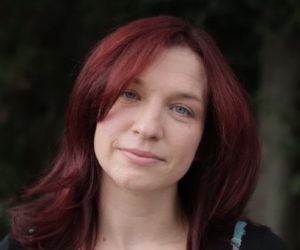|
RCBJ-Audible (Listen For Free)
|
Editor’s Note: The arts are a significant thread in the fabric of Rockland County. They inspire, enrich, and chronicle our lives. They also play a role in our economic well-being; theater, writing, dance, crafts draw us to spaces. They invite strangers to share in our bounty. They are an indelible contribution. Welcome again, Christine Potter, a poet, to RCBJ.
Kelly Jo Lillian: Poetry as Healing, Healing as Poetry
By Christine Potter
 Kelly Jo Lillian is a poet and a healer who lives with us here in Rockland County. She shares my faith that poetry is often wiser than poets themselves—that the poem tells you what you want to say, not the other way around.
Kelly Jo Lillian is a poet and a healer who lives with us here in Rockland County. She shares my faith that poetry is often wiser than poets themselves—that the poem tells you what you want to say, not the other way around.
She’s also beginning to understand that there’s something in the air around these parts. A pandemic refugee from the NYC, Kelly Jo and her husband grabbed a place in Nyack pretty much as soon as she saw—and felt—the town. She wonders if there is some sort of fault line around that part of Rockland letting in all the creative energy. Could be! The Ramapo Fault’s up by Haverstraw, but it’s like I’ve been saying since I started this column: especially when you’re talking about poetry, this county is full of riches.
Another thing I share with Kelly Jo has to do with what she calls herself. She absolutely is a writer–a poet–as well as having a coaching practice designed to open her clients creatively. I spent years teaching writing in the local schools, but it felt like bragging to use the same term for myself that I would for the rest of my ink-stained clan: writer. It wasn’t until I took Karen Joy Fowler’s masterclass at Hedgebrook (a woman’s writing retreat on Whidbey Island, Washington State) and spent the next several years writing and publishing young adult time travel that I felt I could claim the title. And that was even though I’d been writing poetry since I was seven, (and still write it pretty much daily as an elder). Funny thing about that.
Poetry knows you better than you know yourself. Words are magic, really. Kelly Jo started out screen writing and moved on to memoir and then poetry after working with Lily Greenberg, another Nyack poet. But she says she really became a writer at age 42. She was one all along—of course, of course. It’s like Dorothy and the Ruby Slippers: poets can go home anytime they want. We just have to click our heels together.
Kelly Jo says, “For me, poetry comes from a wise, sacred place. When a poem comes in and takes me over, it’s a moment of knowing my own power, my own preciousness. How it heals me is that it tells me I’m powerful. That my voice is valuable. It touches on energy I can only compare to ecstasy.” She calls poetry a “collective heart.” And that’s exactly what it is.
Kelly Jo’s big poetry heroes are Mary Oliver and the Congolese-American spoken word poet Pages Matam. A fan of slam, found poetry, and spoken word poetry’s fire and intensity, Kelly Jo also appreciates the gentle “mama love” of Mary Oliver. In her poem “Five Confessions,” Kelly Jo focuses on five instances of trauma in her own life. It’s a profoundly disturbing piece of work and a brave one.
Five Confessions
1.
My father’s calloused hands smash against my mother’s broad cheeks.
The smile wipes off her face permanently.
My hands grip the bars of the crib.
He begs for forgiveness twenty six years later over eggs.
2.
You saw so much and you were so young. My sister cries hard tears.
Chairs thrown, phone knocked off the wall.
The screen door slams behind me as I run into the summer air.
My mother chases me back into hell.
3.
The dining room table
A monster far worse than my father.
I would like you to give me a kiss.
My mother watches as I do.
I am eleven.
4.
I am twelve and alone with bloody underwear not knowing how to wash myself.
The porcelain sink shrugs.
Five days and I haven’t seen her.
I’’ll be home soon Kel, it’s just the snow.
5.
Father Paul once told me I was guilty.
I sometimes imagine myself elsewhere when I have sex:
I am a ceiling fan.
I am a lake.
I am a handlebar mustache, open on a masseuse table.
I am floorboard, stiff as my four-year-old goes in for a nuzzle with her warm braids.
Look in her eyes, see how guilty she is.
I kiss with a mouth full of hinges.
I get on my knees and realize I never really knew how to pray.
![]()
It takes great courage to be this vulnerable in verse—or in any art. But there is something about catching the raised hand, the lonely, confused wait in the bathroom, that returns power to the woman telling the story. I also admire the sink shrugging, and the flashes of elsewhere/trauma the narrator recounts in the fifth confession:
I am a lake.
I am a handlebar mustache, open on a masseuse table.
I am floorboard, stiff as my four-year-old goes in for a nuzzle with her warm braids.
The “mouth full of hinges” is really fresh and good also. The poem is a true account of how abuse haunts people. It’s doubly healing: for the writer and for the reader.
Kelly Jo’s poem “Mouth” is also brave and detailed:
Mouth
From the private cave of the mouth I am held.
Softly until I blunder and crumble into the ground.
An opening for a long lost daughter.
A mother forgotten.
A sister worlds apart.
Your mouth cave opens wide and I hide in your molars.
Squeeze myself between enamel and the crimson threads that hold each tooth in place.
I get microscope-close searching for the helix that proves we were once one.
Wiggly lines that are unseeable to the eye pulse into my cells.
The hairs around them dance.
A carnival in your throat.
From your voice box a tongue is born.
The webbed toes once sludge in the puddle now stroked until the slick skin goes all goosebumps.
All cedar and sunlight.
All white hot flame.
All little bird’s nest.
All the while I sleep and sleep and sleep in the gaps between your teeth.
![]()
The poem is at once a kiss, a lullaby, and a love song. I really love the transformations towards the close of the poem: cedar, flame, a bird’s nest, and the narrator asleep in the gaps between her beloved’s teeth. The carnival of the throat is pretty great, too. It’s a good poem, either performed (I can imagine it aloud, although I haven’t heard it) or read silently.
Like a number of us these days, Kelly Jo is working on a podcast, to be called Ink and Alchemy. She’s starting to record it in August, and she says it’s “about the relationship between writing and healing, where we explore how the stories we tell can liberate us, connect us, and awaken creative voice in others. Each episode features one published writer reading a short piece of their work, followed by conversation about voice, trauma, transformation, and the threads that connect us through story.” She hopes that listeners will write back to it, creating a “ritual of creative reciprocity.”
She also hosts regular Creative Liberation Circles that meld movement with writing to help people get back in touch with their authentic voices. She appeared on August 3rd at The Angel Nyack. The circles are monthly, and the following one is on the 7th of September, same time, same place. You can get in touch with Kelly Jo for coaching, virtual circles, and workshops at her website, https://kellyjolillian.com She’s also on Instagram as @liberated.creative.
Because we are on the first day of an excessive heat warning from the necessary and beleaguered National Weather Service, here’s a poem from my deep past about being very young in the hottest part of summer. It ran originally in the poetry feed Autumn Sky Poetry Daily.
Trying To Read The Gulag Archipelago On My First Hundred Degree Day
Married to my first husband for one year, in our
apartment with only its bedroom air conditioned,
I waited until someone on TV announced it was
really one hundred degrees outside and walked
to the courtyard through our hall’s airless murk
with the sole book on our shelves I hadn’t read.
I sat under a crabapple tree on brown grass and
watched the afternoon sun spattering the ground—
bits of white heat that wobbled a little. There was
a breeze somewhere but I couldn’t feel it. I wanted
to know what a hundred degrees felt like and this
was it: a desiccated leaf next to me that I crumbled
in my fingers and blew away. Sweat at the back of
my neck, under my hair and my breasts, even in
the shade. An icy mountain of a book I could not
manage to read and still haven’t. Luminous green
bottles of beer inside, in the noisy refrigerator with
the chicken for dinner and a marriage that showed
no signs of failing, yet. Everything for the first time,
trying to make it all part of me, to breathe in and hold.
![]()
See you in September, as the song says. Let’s hope things have cooled off by then.














